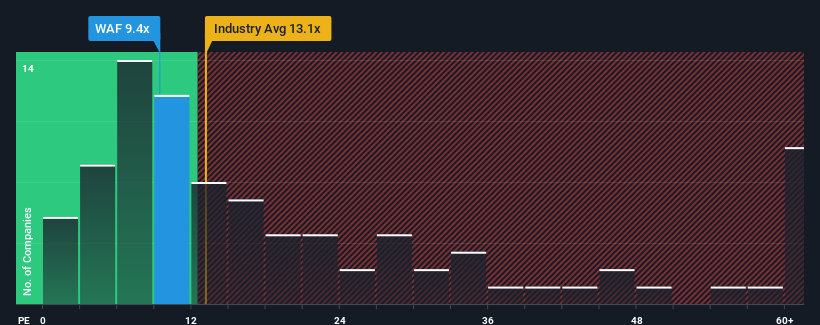- Australia
- /
- Metals and Mining
- /
- ASX:WAF
West African Resources Limited's (ASX:WAF) Shares Leap 35% Yet They're Still Not Telling The Full Story
West African Resources Limited (ASX:WAF) shareholders have had their patience rewarded with a 35% share price jump in the last month. The last 30 days bring the annual gain to a very sharp 28%.
Although its price has surged higher, West African Resources' price-to-earnings (or "P/E") ratio of 9.4x might still make it look like a strong buy right now compared to the market in Australia, where around half of the companies have P/E ratios above 21x and even P/E's above 37x are quite common. Nonetheless, we'd need to dig a little deeper to determine if there is a rational basis for the highly reduced P/E.
With earnings that are retreating more than the market's of late, West African Resources has been very sluggish. The P/E is probably low because investors think this poor earnings performance isn't going to improve at all. If you still like the company, you'd want its earnings trajectory to turn around before making any decisions. Or at the very least, you'd be hoping the earnings slide doesn't get any worse if your plan is to pick up some stock while it's out of favour.
See our latest analysis for West African Resources

How Is West African Resources' Growth Trending?
The only time you'd be truly comfortable seeing a P/E as depressed as West African Resources' is when the company's growth is on track to lag the market decidedly.
If we review the last year of earnings, dishearteningly the company's profits fell to the tune of 11%. Even so, admirably EPS has lifted 40% in aggregate from three years ago, notwithstanding the last 12 months. Although it's been a bumpy ride, it's still fair to say the earnings growth recently has been more than adequate for the company.
Shifting to the future, estimates from the three analysts covering the company suggest earnings should grow by 21% each year over the next three years. That's shaping up to be materially higher than the 17% per annum growth forecast for the broader market.
In light of this, it's peculiar that West African Resources' P/E sits below the majority of other companies. Apparently some shareholders are doubtful of the forecasts and have been accepting significantly lower selling prices.
What We Can Learn From West African Resources' P/E?
Even after such a strong price move, West African Resources' P/E still trails the rest of the market significantly. Generally, our preference is to limit the use of the price-to-earnings ratio to establishing what the market thinks about the overall health of a company.
Our examination of West African Resources' analyst forecasts revealed that its superior earnings outlook isn't contributing to its P/E anywhere near as much as we would have predicted. When we see a strong earnings outlook with faster-than-market growth, we assume potential risks are what might be placing significant pressure on the P/E ratio. At least price risks look to be very low, but investors seem to think future earnings could see a lot of volatility.
Plus, you should also learn about this 1 warning sign we've spotted with West African Resources.
It's important to make sure you look for a great company, not just the first idea you come across. So take a peek at this free list of interesting companies with strong recent earnings growth (and a low P/E).
Valuation is complex, but we're here to simplify it.
Discover if West African Resources might be undervalued or overvalued with our detailed analysis, featuring fair value estimates, potential risks, dividends, insider trades, and its financial condition.
Access Free AnalysisHave feedback on this article? Concerned about the content? Get in touch with us directly. Alternatively, email editorial-team (at) simplywallst.com.
This article by Simply Wall St is general in nature. We provide commentary based on historical data and analyst forecasts only using an unbiased methodology and our articles are not intended to be financial advice. It does not constitute a recommendation to buy or sell any stock, and does not take account of your objectives, or your financial situation. We aim to bring you long-term focused analysis driven by fundamental data. Note that our analysis may not factor in the latest price-sensitive company announcements or qualitative material. Simply Wall St has no position in any stocks mentioned.
About ASX:WAF
West African Resources
Engages in the mining, mineral processing, acquisition, exploration, and project development of gold projects in West Africa.
Exceptional growth potential with flawless balance sheet.
Similar Companies
Market Insights
Community Narratives


Recently Updated Narratives

Constellation Energy Dividends and Growth

CoreWeave's Revenue Expected to Rocket 77.88% in 5-Year Forecast

Bisalloy Steel Group will shine with a projected profit margin increase of 12.8%
Popular Narratives


MicroVision will explode future revenue by 380.37% with a vision towards success


NVDA: Expanding AI Demand Will Drive Major Data Center Investments Through 2026



